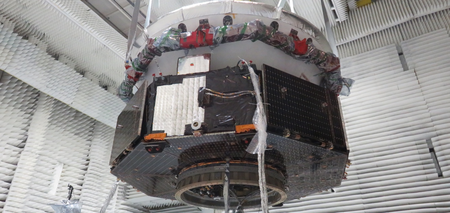The HabitAbility: Brines, Irradiance and Temperature (HABIT) instrument developed by the Planetary Science Group at the is undergoing the ExoMars environmental tests.
HABIT was integrated in December 2019 in the ExoMars Surface Platform in Thales Alenia Space (TAS), in Cannes (France). The preliminary tests of communication and HABIT operation were successfully; all the sensors were operating nominally and the data were received and processed in real time as it will soon be done on Mars. Now, as part of the environmental tests, the Surface Platform, integrated within the carrier and descent modules will be tested in the anechoic chamber at ThalesAlenia Space (TAS) in Cannes, France. These tests would confirm if the different components in ExoMars 2020 are ready to endure the harsh conditions of space on its eight-month journey to Mars. The anechoic chamber tests will verify that the modules work well together without any glitches or interference.
HABIT is one of the two European payloads of the Surface Platform Kazachok that is part of the ExoMars 2020 mission to Mars. ExoMars is a joint program by the European Space Agency (ESA) and the Russian Space Agency ( Roscomos ). The ExoMars mission will pursue one of the outstanding questions of our time by attempting to establish whether life ever existed or is still active on Mars today. This is specifically the goal of the payloads of the rover and HABIT, mounted on the Surface Platform, will contribute to this later goal, namely it will assess the present-day habitability of Oxia Planum, in terms of key environmental variables.
HABIT includes the BOTTLE (Brine Observation Transition To Liquid Experiment) module to capture at night-time atmospheric water by hydration and deliquescence of salts that exist on Mars, and 3 environmental sensors devoted to monitoring the full diurnal and seasonal variations of the ground and air temperature, the near surface winds and the UV irradiance. HABIT will allow for extra long-term climate and atmospheric monitoring and will provide an unequivocal proof, for the first-time, of the existence of liquid water on Mars, while willserve to demonstrate the In-Situ Resource Utilization potential of certain salts to collect atmospheric water for the future exploration of Mars.
HABIT will be the first demonstrator of a water capturing system on the surface of Mars, and the first European In-Situ Resource Utilization in the surface of another planet.


